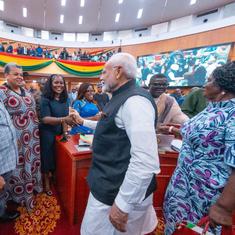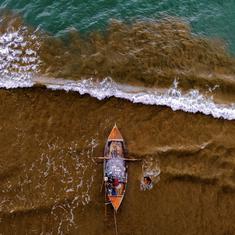On Tuesday, when a large portion of the confidential Henderson Brooks-Bhagat report appeared online, the two switched sides.
Habibullah, who had at CIC decided to keep the report secret in the interests of national security, said that he approved of Australian journalist Neville Maxwell’s decision to put a portion of the report in the public domain. But Nayar, after spending decades fighting to end the suppression of the report, insists that the timing of Maxwell decision to upload the report, right before the Lok Sabha elections, is deeply suspicious.
Maxwell, now 87, was the correspondent for The Times during the 1962 war and in 1970 published a book about the conflict titled India's China War. Among its sources, the book used the Henderson Brooks-Bhagat report, an internal review commissioned by the Indian Army into the debacle. The report, named for the two Indian Army officers who authored it, was submitted to the government in 1963 but has never been declassified. As late as April 2010, Defence Minister AK Antony said that it could not be made public because its contents “are not only extremely sensitive but are of current operational value".
It was Nayar’s efforts, both as a journalist and as a Rajya Sabha member, that kept Henderson Brooks-Bhagat in the news over the years. Failing to gain access to the report after writing a letter to the Prime Minister and demanding in Parliament that the report be released, Nayar filed a Right to Information petition in 2005. Since this was turned down by the CIC in 2009, Nayar took his plea to the Delhi High Court where it is languishing.
To be sure, neither Habibullah nor Nayar are backtracking. Habibullah still insists that he made the right decision as CIC in 2009 to not release the report, while Nayar maintains that the government ought to put the documents out through official channels. Yet their differing reactions to the way the Brooks Henderson-Bhagat report made it to the public domain – through a document dump on Maxwell’s website that went viral – is an intriguing subplot to a story 52 years in the making.
Maxwell's sudden decision to put the report online has left Nayar suspecting political motives. “[Maxwell] is complicit in a cover-up," the journalist said. "Why is he putting it up after so long? He had it. I think he has done it because of the impending elections.”
Maxwell’s website went down soon after the Indian social media sphere got wind of the document, but a mirrored copy on the Indian Defence Review carried his blogpost where he explained his decision to post the report. Maxwell claimed he had, over the years, offered the documents to a number of editors of Indian newspapers, all of whom had turned him down, citing either national security concerns or retribution from the government.
“Although surprised by this reaction, unusual in the age of Wikileaks, I could not argue with their reasoning," Maxwell wrote, per the copy pasted on IDR. "Later I gave the text to a fourth editor and offered it to a fifth, with the same nil result. So my dilemma continued – although with the albatross hung, so to speak, on Indian necks as well as my own. As I see it now I have no option but, rather than leave the dilemma to my heirs, to put the Report on the internet myself.”
Nayar said it was easy to imagine newspaper editors refusing to publish the report: “In this country we have this silly jingoism, which makes us journalists think that reporting on any defence information is unpatriotic,” he said. Yet he remained suspicious about the timing of the partial upload. “What took him so long? He has had years to put it up,” Nayar said.
On the opposite side of the decades-old battle to release the war report, Habibullah, who hails from an Army family, said he approved of Maxwell’s decision to put the documents on the internet. “It’s correct, it’s right what he’s done,” Habibullah said. “As I said, as CIC, I was guided by my duty as part of the government of India. Doesn’t matter if it was the Congress government or any other government. For a person like me, with my Army background, I wouldn’t want to take a risk on national security.”
In fact, the former CIC admitted openly that personal considerations had played a significant role in his decision to prevent the release of the report. “As Chief Information Commissioner, I was rather notorious for disclosing things the government didn’t want me to,” Habibullah said. “But here, there was a question of national security, there was my own affiliation with the Indian Army…many of the people who were there in that conflict were people I called uncle.”
With this in mind, Habibullah said he found no problem with Maxwell’s decision to put out the documents on the internet. “I would defend the right of every citizen to research, write and publish what they find; even if they are American or Assange,” he said. “I would not say he is a villain. I would say he has compromised the government, but the government should have done a better job not to get compromised. His right is inalienable.”
The government of India, or at least the Defence Ministry, doesn’t seem to agree with either of the former friends, who still find themselves on opposite sides of the debate. In an official statement on Tuesday, the ministry decided it was simply not going to touch the issue: “Given the extremely sensitive nature of the contents of the Report, which are of current operational value, it is reiterated that the Government of India has classified this Report as a Top Secret document and, as such, it would not be appropriate to comment on the contents uploaded by Neville Maxwell on the Web.“










